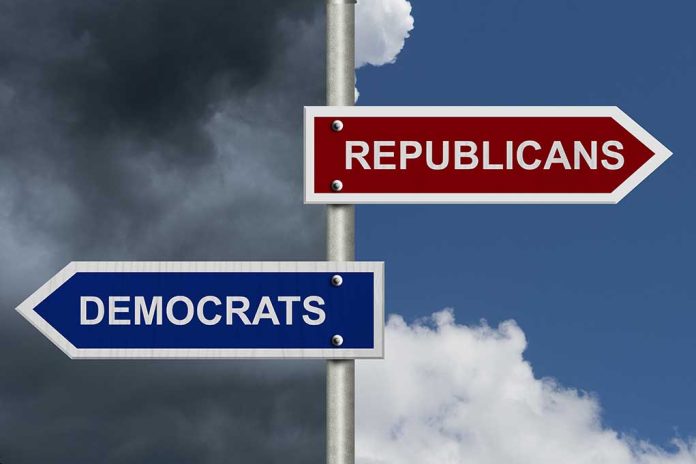
Jasmine Crockett’s controversial comments about Byron Donalds’ interracial marriage have intensified discussions on racial consistency within the Democratic Party.
Key Takeaways
- Jasmine Crockett faced intense backlash for her comments regarding Byron Donalds’ interracial marriage.
- Crockett suggested Donalds was “whitewashed” due to his marriage, sparking allegations of a double standard within the Democratic Party.
- Critics argue Crockett selectively applies her standards, overlooking similar situations with Democratic leaders like Kamala Harris.
- Crockett’s remarks have fueled debates about the party’s approach to race and identity.
Crockett’s Comments Spark Controversy
Rep. Jasmine Crockett (D-TX) has come under fire following remarks made during her February appearance on “The Breakfast Club,” where she questioned Rep. Byron Donalds’ (R-FL) cultural alignment, accusing him of being “whitewashed” due to his interracial marriage to a White woman. This topic has reignited debates surrounding racial consistency and identity within the Democratic Party, as critics accuse Crockett of harboring double standards when compared to her silence on the interracial marriages of other Democratic figures like Kamala Harris.
The backlash intensified after a nine-month-old clip of Crockett’s comments resurfaced across social media, prompting conservatives and MAGA supporters to bring it into the spotlight. Her statement that “life was better under Jim Crow” and reference to Donalds being directed by others were among the more contentious statements. These remarks have been widely criticized across conservative circles as indicative of a concerning double standard within her party.
Double Standards and Racial Consistency
Prominent critics such as Jason Whitlock and Shemeka Michelle have highlighted what they perceive as a hypocrisy in Crockett’s stance, specifically pointing out her support of other Democrats in interracial marriages. Whitlock noted, “Ketanji Brown Jackson, I believe she’s married to a white Jewish man. Haven’t heard Jasmine Crockett talk about that.” Meanwhile, Michelle contends, “This is what they do; they just spew trash talking points that make absolutely no sense.” These observations stress the selective scrutiny applied to GOP members versus Democratic allies.
Crockett’s aggressive criticism of Black conservatives, whom she referenced as “skinfolk who definitely are not our kinfolk,” has further alienated her from Republican circles. This appears part of a broader trend of racial discourse within the Democratic Party, raising questions about the sincerity and consistency of its approach to racial and cultural matters.
Conclusion and Ongoing Debate
Crockett’s remarks on Texas Governor Greg Abbott and other Trump allies have further underscored the volatile nature of racial and political discourse in America today. Fox News has remained vocal, interviewing figures like Kevin Corke to spotlight what they label “racism,” calling for accountability. Despite the backlash, Crockett remains a steadfast and outspoken figure within the Democratic Party as election season approaches.
“This is a leftist who’s expressing some racial animus, which seems to go against what leftists say they stand for,” said Whitlock.
The discussion around Crockett’s comments is unlikely to dissipate soon, as the broader debate on racial consistency and identity within political parties continues to develop. Her case is a poignant example of the challenges in addressing race amidst evolving societal expectations and political strategies.


![Trump Caught NATO Off Guard Trump JUST Completely U-Turned [Total Game Changer]](https://usnewsbreak.com/wp-content/uploads/sites/13/2026/01/Trump-JUST-Completely-U-Turned-Total-Game-Changer--218x150.jpeg)


